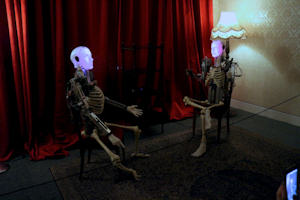I think therefore I am a robot?
01 Mar 2016
University scientist helps create artwork for exhibition inspired by Manchester pioneer Alan Turing for the European City of Science 2016

Two robots having a conversation about the nature of consciousness is one of the highlights of a new exhibition inspired by Manchester pioneer Alan Turing.
The Imitation Game – which has opened at Manchester Art Gallery as part of the European City of Science 2016 and runs until June 5 – is a showcase for eight international artists who explore the theme of machines and the imitation of life.
Swedish artist Tove Kjellmark has created a new robotic artwork entitled Talk in collaboration with Professor Steve Furber, from the School of Computer Science, and also in partnership with the Royal Institute of Technology (KTH), Stockholm.
The two seated robots discuss the nature of human consciousness – and their behaviour is determined by the SpiNNaker brain-simulation technology which has been developed in Manchester by Professor Furber and his team working on The Human Brain project.
The skeletal robots have been built by the artist with a team of students in the Mechatronics Division at KTH.
“It’s fantastic to see the installation operating after all our planning,” said Tove Kjellmark at the exhibition launch.
The work, explained Tove, explores the potential for machines to perform as humans and asks us to consider how we choose to interact with them - and how we feel about their response to us.
Tove explained that this exciting collaboration between Professor Furber began when she was invited to present her work at the international conference for BrainScaleS, a project which focuses on brain-inspired computer architectures.
The Imitation Game exhibition takes its name from the test proposed by Alan Turing as a way of determining if machines possess artificial intelligence.
Get involved
The designation of European City of Science to Manchester is a first for the UK – and the University is playing a big part in the celebrations, which include the Euroscience Open Forum (ESOF).
There are a myriad of ways you can contribute to the proceedings: through sharing your stories, images and ideas, or promoting your research, or as part of events you are hosting.
The University has a team of facilitators, who can connect you with ESOF organisers and will also monitor and record ideas and activities suggested for European City of Science and its associated events.
For further information, visit:
